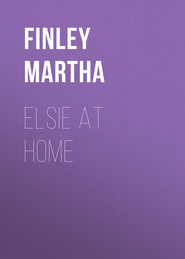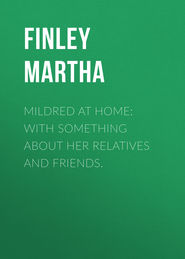По всем вопросам обращайтесь на: info@litportal.ru
(©) 2003-2024.
✖
Mildred's New Daughter
Настройки чтения
Размер шрифта
Высота строк
Поля
“Be quiet, sir!” commanded Coote, turning a flushed and angry face upon the little boy.
“Give back that candy and I’ll be quiet enough,” returned Harry sturdily.
“What a hog of a man to be robbing those poor little children of their candy!” exclaimed a motherly-looking country woman in the next seat, apparently addressing her remark to a young girl at her side, but speaking loud enough for Coote and other near-by passengers to hear.
The train was just starting. Coote leaned over the back of the seat, bringing his mouth near to Harry’s ear.
“You keep quiet, you young dog,” he said savagely, “or I’ll pitch you out the window and let the train run over you and kill you.”
“Oh, you wicked, wicked man!” cried Ethel, with a burst of tears, putting her arm round Harry and holding him close; “if you do you’ll get hung for murder.”
“Take care, miss; it wouldn’t take long to send you after him,” was the threatening rejoinder, and Coote leaned back in his seat again, took a newspaper from his pocket, and sat looking over it while devouring with evident enjoyment the candy of which he had robbed the children.
CHAPTER VI
It was a lovely day early in October, and the children enjoyed gazing out upon the landscape, so new to them, the gorgeous coloring of the forest trees particularly attracting their attention. They were close together, having possession of a corner near the door of the car, where two seats at right angles gave them abundance of room to move about and gaze their fill, now on the outer world, now at the occupants of the seats near at hand. They were pretty quiet, and disturbed no one but each other with their prattle and fidgeting.
The sun was near its setting when they arrived at their destination. They were bundled very unceremoniously out of the car and hurried along the street by Mr. Coote, who seemed in hot haste to reach his parsonage, some two or three squares distant. Poor little Nannette found it very hard – indeed quite impossible – to keep up with him in his rapid strides, though Ethel on one side and Blanche on the other were doing their utmost to help her along. And even they, without that hindrance, could not possibly have kept pace with their conductor. Nor could Harry, and he too fell behind with them, and all four were crying more or less when they reached the gate where Coote stood awaiting their coming, with a scowl of impatience upon his ugly features.
“I thought you were close behind me. You’ll have to learn to walk faster. Dawdling along is something I’ll not put up with,” he growled, snatching Nannette up roughly and carrying her into the house, the others following in obedience to the gruff order, “Come along in, all o’ you.”
A middle-aged woman – tall, rawboned, of scowling countenance and stiffly starched in manner, stood waiting in the hall.
“So you’ve brought ’em,” she said in icy tones. “Well, they’ll make trouble and work enough, but the pay will help to eke out that starvation salary of yours.”
“Take care, Sarah,” he muttered, setting down the sobbing Nannette, none too gently, upon the floor, “little pitchers have big ears, and there’s no knowing when or where they might blab.”
“Just let me catch ’em at it and they’ll not be apt to do it a second time,” she said, turning upon the trembling little ones a look so angry and threatening that they clung together in affright, tears coursing down their cheeks and their young bosoms heaving with sobs.
“Stop your crying, every one of you!” she commanded. “Come right in here and eat your suppers,” opening a door near where she stood, “and then you shall go to bed. But no. Pull off your hats and coats first and hang them here on the rack in the hall. You must learn to wait on yourselves, and that there’s a place for everything and everything must be in its place, and the sooner you learn it the better it’ll be for you; for dirt and disorder are never allowed in the house where I’m at the head of affairs. I’ll help you this time, but you’ve got to help yourselves after this.”
She had seized Nannette as she spoke, and was jerking off her coat. “Well, I declare if you aint all sticky with candy!” she exclaimed, in a tone of disgust. “What on earth did you let her have it for, Coote?”
“’Twas none o’ my doing,” he replied; “their uncle gave it to ’em, but I can tell you it’ll be one while before they get any more.”
At that Nannette looked up piteously, and with quivering lip, into Ethel’s face, but did not dare to so much as whimper. It was a very faint and watery smile Ethel gave her in reply.
They were hurried into the dining room, a barely furnished apartment with whitewashed walls, green paper window blinds, and rag carpet; exquisitely neat and clean, but wearing like its mistress a cold and cheerless aspect in striking contrast with the beautiful homes of their uncles, which the children had left but a few hours before.
The table was covered with a very white and smoothly ironed but coarse cloth, and on it stood a pitcher of milk, a plate of bread, and four bowls of heavy ironstone china, each with a silver-plated spoon beside it. The children were quickly seated, told to fold their hands and shut their eyes while repeating a short grace after Mrs. Coote. Then milk was poured into each bowl, a piece of bread laid beside it, and they were ordered to break the bread into the milk, take up their spoons and eat, which they did, Mrs. Coote seating herself opposite them and watching with eagle eyes every movement they made.
No one of the four ventured a word, much less to refuse obedience to the order given. Both bread and milk were sweet and good, and after the first taste the little folks ate with appetite, Mrs. Coote refilling the bowls and supplying the bread without stint.
“Eat all you want,” she said in a slightly softened tone; “I was never one to starve man or beast; you’ll not be fed on dainties here, but shall have all you can eat of good, wholesome victuals.”
Presently the sound of heavy footsteps in the hall was followed by the opening of the door of the dining room, and Mr. Coote put in his head, saying: “Here’s the trunk, Sarah; what’ll you have done with it?”
“They’ll sleep in the room over the kitchen; have it carried up there,” she replied.
When the children had finished their meal, “Now,” she said, “you shall go up to your room and beds,” and they followed submissively as she led the way through the hall and up a back staircase.
The room into which she presently ushered them looked as scrupulously clean and orderly, and also as bare and desolate, as the dining room. There was a double bed which she told the little girls they were to occupy, and in another corner a cot bed which she said was for Harry. The remaining pieces of furniture were a washstand with bowl and pitcher, a chest of drawers with a small mirror over it, two wooden chairs of ordinary height and two little ones.
“Sit down on those chairs, every one of you, and keep still while I take out your night clothes from this trunk,” said Mrs. Coote. “Where’s the key?” looking at Ethel.
“In my pocket, ma’am,” returned the little girl, producing it with all possible despatch. “The nurse told me she had put all our nightgowns right on top.”
“Yes, here they are; looking well rumpled too. Plenty o’ folks in this world that don’t care whether they do a thing right or wrong. I hope you’ll not make one of that sort, Ethel.”
“I’ll try not to, ma’am,” replied the little girl meekly.
“Well, help your sisters and brother to undress, hang their clothes up neatly on those pegs along the wall there – so they’ll get a good airing through the night – then undress yourself and do the same with your own clothes. Don’t forget your prayers either. I’m going downstairs now, but I’ll be in again presently to see that you are all snug and comfortable, and to finish unpacking your trunk.” With these concluding words she hurried out, closing the door after her.
“Oh, me don’t ’ike dis place; me wants to go home,” sobbed Nannette.
“So do I,” said Harry, tears rolling down his cheeks. Blanche too was crying, though softly, and Ethel’s eyes were full of tears. But she tried to be cheerful and brave.
“We’ll make haste to bed and to sleep, and in the morning we’ll all feel better,” she said, trying to speak cheerfully. “Blanche and I will undress you little ones, then get undressed ourselves, and soon we’ll all be in bed.”
And so they were, Ethel last of all; the other three were asleep when at last her weary little head was laid upon its pillow. Her young heart was sad and sore, for it seemed a cheerless sort of home they had come to – oh, so different from that which had been theirs but a few short months before, with the dear parents whom she would see never again upon earth. With that thought in her mind she wept herself to sleep.
CHAPTER VII
In the meantime Mr. and Mrs. Coote were in the dining room, partaking of a much more elaborate meal than had been given to their young charges.
“Well, what do you think of them?” queried Coote, stirring and tasting his tea, then reaching for the sugar bowl and helping himself to another spoonful of its contents.
“I can tell more about that when I’ve had time to make their acquaintance,” she answered dryly.
“The boy’s an impudent little rascal,” remarked her husband, reddening with anger as he spoke; then, in reply to her enquiring look, he went on to tell the story of the candy.
She listened in silence and with a look of growing contempt.
“Well, have you nothing to say?” he at length demanded in an irate tone.
“Nothing, except that if I was a man – or called myself one – I’d be a little above robbing such a mite of a child of his sweets.”
“No; in your great kindness of heart you’d prefer to let him make himself sick eating them,” he retorted in a sarcastic tone.
“I think I’d as lief risk it for him as for myself,” she returned significantly; “specially as the stuff had been given by the uncle to them, not to me.”
“Young children haven’t the same digestive powers that a hearty grown person has,” he said rather angrily, “and I maintain that it was neither more nor less than an act of kindness to make away with some of the dangerous stuff by eating it myself.” A slight, scornful laugh was the wife’s only reply; then she began questioning him with regard to the amount to be paid them for the board, care, and education of the children. She was well pleased with his reply, for the terms offered by the uncles were liberal.
“They being so young, of course most of the care and labor will fall to your share, my dear,” remarked Coote suavely.
“Oh, of course! when was it otherwise with any of your undertakings?” she asked with withering sarcasm.
“Well, that’s exactly what you should do. What was Eve made for but to be Adam’s helpmeet?” he returned with an unpleasant laugh.











